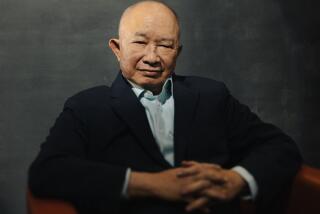McG takes wing
- Share via
McG looks far too young to have a $100-million movie riding on his shoulders. But the 32-year-old director of “Charlie’s Angels: Full Throttle” was even more of a question mark in the first installment, his feature film debut. Reared in Newport Beach, he made his name in music videos (Sugar Ray, Wyclef Jean) and award-winning commercials (the Gap, Ikea). Confounding skeptics, “Charlie’s Angels” took in $125.3 million at the domestic box office.
He was born Joseph McGinty Nichol. “People think it’s a ‘Cher’ or hip-hop thing, but I’ve been ‘McG’ since I was a child.” In the sequel, due out on Friday, the Angel contingent -- Cameron Diaz, Lucy Liu and Drew Barrymore -- try to prevent a missing FBI witness protection database from falling into the wrong hands.
Filmmaking is a bit of a detour for someone with a psych degree from UC Irvine.
I wanted to be a psychiatrist -- probably because of my own neurotic tendencies. I’m given to depression. Though I never got the girl and wasn’t the most popular kid in school, I developed a substantial dream life with a Walter Mitty component. John Hughes films, with their understanding of the teenage condition, also spoke to me at a critical time -- helping to free me to follow my passions of film and music.
You once called yourself a “Southern California lightweight.” Still feel that way?
I have a lot of living to do. My palette is pop culture. I’m the product of mini-malls. There’s a numbness -- and sadness -- that comes from being surrounded by urban sprawl, developers creating cookie-cutter houses. I’m delighted that my medium is film, which can be nearly as influential as a great teacher or a best friend. This film has references to “Rebel Without a Cause,” “Cabaret,” “Ice Castles” and, when the girls come over the couch in the opening, “Singin’ in the Rain.” I view the movie as an ode to Hollywood -- the Walk of Fame, the Griffith Observatory. It’s important we know where we came from, see things as they were.
Why Bernie Mac instead of Bill Murray, who, insiders said, had some personality clashes on the first shoot?
Bill is serious about taking a character to the highest level -- which can lead to heated conversations. I welcome that. I didn’t try to get him back, though, because I wanted the film to be a platform -- a way of showing that, if you pick yourself up from the bootstraps, you can make things happen. In contrast to the [1970s] all-Anglo TV series, Liu is of Asian descent and Diaz half-Cuban. Cleese is Liu’s father, in keeping with the constant curveball of the picture. Mac is from a tough Chicago neighborhood and has experienced tragedy. He has a different pedigree and I wanted that voice to come through.
The action features martial arts, surfing, motocross, roller derby. Diaz even delivers a calf. Did the trio do most of their stunts?
The girls were troupers in a film that called more for “Raging Bull”-type action than the balletic, stylized sort in “Crouching Tiger, Hidden Dragon.” Working with martial arts master Chun Yen Yuen, their level of fitness -- and confidence -- was shockingly better than in the first. Still, Demi tore a thigh muscle. Cameron ruined her back. Drew cracked her tailbone and was out for weeks.
Did you feel pressure to top the first?
I’m wired in a strange way. Anxiety is a huge component in my life -- but not in my filmmaking. I viewed the first “Charlie’s Angels” as a traveling circus and identified with the excitement. Besides, it was fun being the underdog. Despite the success of fantastic filmmakers like Spike Jonze [“Adaptation”] and David Fincher [“Seven”], there’s still a stigma attached to music videos. People don’t realize they’re a great place to cut your teeth and develop your own imprint. I try to reside between the off-center Jonze and the very methodical Alfred Hitchcock. Down the road, I’d like to branch out, remaking “Cleopatra” and doing a movie on Evel Knievel, a tragic, heroic, beautiful disaster.
-- Elaine Dutka
More to Read
Only good movies
Get the Indie Focus newsletter, Mark Olsen's weekly guide to the world of cinema.
You may occasionally receive promotional content from the Los Angeles Times.









